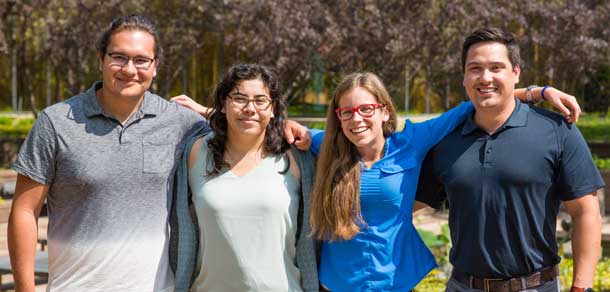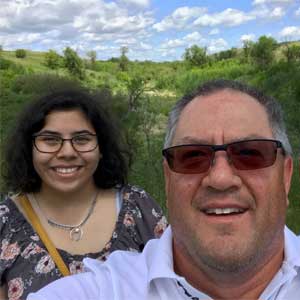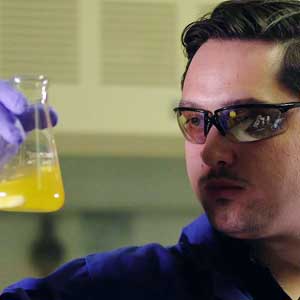In many cases, mentoring is the ultimate example of “Me to We”.
Mentoring relationships have long-lasting, powerful positive effects on a person’s personal, academic and professional life. But they can also lead to profound social change
The University of Saskatchewan states that “Indigenous students are strongly under-represented among the University’s undergraduate STEM (science, technology, engineering and math) degree programs – four per cent and three per cent in the Colleges of Arts and Science and Engineering, respectively, compared to 14 per cent in social sciences, and 24 per cent in education.”
The Saskatchewan Research Council (SRC) is aiming to correct this. SRC is proactively recruiting students for its Aboriginal (First Nations, Inuit and Métis) Mentorship Program (AMP) that connects Indigenous post-secondary students in the STEM disciplines with SRC mentors in the same or similar disciplines to help them take their education and experience to the next level.
“Over the past four summers, I’ve had the opportunity to watch some incredible mentoring relationships form and grow,” says SRC Communications and Media Advisor Rebecca Gotto, who manages the AMP.
Two years ago, AMP matched first-year Environmental Engineering student Tomika with mentor Mark Calette, Senior Advisor of Community Engagement on SRC’s Environmental Remediation team.
The Mentor’s View
For Calette, the best part of the AMP is the opportunity to learn about a variety of Indigenous cultures and perspectives.
“I enjoy having people come on board with us who are students and are trying to reach their goals in their career. They come from different Indigenous backgrounds and bring a different vitality to our office and to our teams.”
The highlight of being a mentor for Calette comes down to fellowship.
“ I just really enjoy the fellowship, comradery, but most importantly, I really appreciate the sharing of knowledge.”
“There’s so much knowledge Tomika brings to our team and to me personally. Hopefully, I have been doing that for her as well. I’ve truly experienced so much personal growth by being a mentor, so it’s really a two-way thing. I think we are equally benefitting from this relationship, both at work and even somewhat on a personal level.”
Calette feels humbled to think of the long-term benefits of the mentoring experience.
“I’m hoping that some of the knowledge I’m able to share can be used in the next generation of our team leaders, our community leaders. If that information can help my mentees and others to grow to become the leaders of the future, then that’s wonderful. I’m excited about what I see.
The Mentee’s Perspective
It is ironic that among the things Calette helped Tomika learn was how to carry out community engagement with northern Indigenous communities.
“I’m from southern Saskatchewan so I’ve worked with southern Indigenous communities. It’s similar to working with northern Indigenous communities, but it’s also different. Without Mark’s mentoring, I wouldn’t know how to do community engagement – how to work with various organizations, how to contact them, how to write official documents and review them.”
She says Calette also helped her bring focus to her career.v
“Through this program, I figured out where I want to go with my career. When I started university, I knew I wanted to be an environmental engineer, but I didn’t really know where in environmental engineering I wanted to work. I know now that I really want to focus on remediation. I’ve also grown as a person and know who I want to be and how to make that happen. Mark has been such a large part of that.”
Perhaps the ultimate benefit of the AMP for Tomika has been the sense of community with peers.
“I have really enjoyed getting to know all the other Indigenous students within the AMP program. It makes you feel like you’re not alone as an Indigenous student pursuing STEM because there’s not a lot of role models. Having a good role model who is Indigenous pushes the path for everybody else.”
Other Voices
Over the last three years, the AMP has matched 18 Indigenous students with STEM mentors at SRC which has produced numerous success stories.
Chennoa Tracey, an assistant engineer with the SRC Industrial Engineering team is a former AMP student. Tracey started as a fourth-year mechanical engineering student in the Aboriginal Mentorship Program. After graduating from the University of Saskatchewan this spring, she jumped on the opportunity to join SRC permanently on its Industrial Engineering Team.
As a Métis woman going into STEM wasn’t a stretch for Tracey since she had role models in her life to look up to who encouraged that career path.
“I have a father who is very tech-savvy and a couple of relatives who were engineers before me. I feel like they were my role models and helped me decide what I wanted for myself. I could see exactly what they did and I could see how what they did affected the world around them.”
Tracey says the AMP program provided her with a great network, particularly with other Indigenous students studying STEM.
Tyler Posch, a chemical engineering summer student, has been with the AMP program for two years with SRC’s Minerals Team. In that time, he’s been able to work on uranium processing projects from start to finish and sees the advancement of technology as a big driver around why Indigenous students might choose a career in STEM.
“Technology is advancing and it is making people’s lives easier. It is important not only for Indigenous students but for everyone to focus on the environmental impacts that different processes have.”
Posch is the first member of his immediate family to attend university and went to great lengths to get to where he is today.
“I went back to high school when I was 23 and upgraded all my grade 12 classes. I decided I was going to start the journey (to be an engineer) and now I am a year away from graduating and being a chemical engineer.”
Inspiring Others
As Gotto sees it, AMP is not aimed only at creating change for particular Indigenous students but for generations of Indigenous students to come.
“There are a variety of reasons why Indigenous students are choosing careers other than ones in STEM. But what I have learned through managing AMP is that those who have chosen a career in STEM have done so with purpose,” says Gotto.
“I see a passion in our students that often comes from their upbringing or cultural background.”
“I see students who want to inspire others and make the world a better place. They even inspire me, someone who would never have considered a career in STEM, to think outside the box and learn more about how STEM can truly change the world.”
This article was adapted with consent and cooperation from original SRC articles including Three Indigenous Students Share Why They Chose Careers in STEM by Rebecca Gotto, “We are equally benefiting from this”: Inside a mentorship program for Indigenous students by Rebecca Gotto and other articles.



